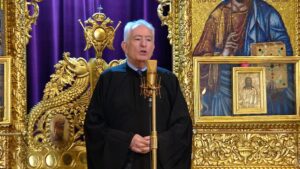The three expressions of the divine law
2 July 2022On Sunday 26 June, Professor Economou spoke at the Monastery of Kykkos, Cyprus,
interpreting the Epistle reading for the day (Rom. 2, 10-16).

The first point has to do with the law of the Old Testament. It’s the revelation of God through the history of Israel, and for this reason the Old Testament is of enormous importance for both history and civilization, because it has Jesus Christ himself as its point of reference, who is the Messiah and redeemer of the world. This is why the Old and New Testaments can’t be separated even though some ignorant and uneducated people would like to think of the Old Testament as merely a book about the history of Israel, of no interest to us. Theologically, it’s the foundation stone of the messianic expectation of the coming of Christ, the Messiah and redeemer of the world. This is the reason why Christ assures us that he came ‘not to abolish’ the law of the Old Testament, but ‘to fulfil it’.
This word [‘fulfil’] has two theological meanings. ‘To fulfil the law’ means to add to and
complete those points where this law didn’t complete its reference to the presence and way of life of people who are citizens of the New Testament, that is the Church. This is why ‘addition to’ is also ‘completion’. At the same time, this expression of Christ’s that ‘I did not come to abolish the law but to fulfil it’ means that the law is fulfilled in his own person. So two meanings, then. ‘I complete the law of the Old Testament and I put into effect that law, because when the Prophets spoke about the Messiah, they were referring to me’. The prophecies of Isaiah, in particular, are so abundant that he’s been called the fifth evangelist, because he refers so precisely to the person, the advent and the mission of Christ that his prophecies can be viewed as the beginning of the message of the Gospels.
The second point is the law of the New Testament. It’s the revelation which Christ himself made through his message of redemption and his life. Because Christ didn’t come in order to bring about a social revolution, nor any social teaching, nor philosophical discourse, but to set out the manner in which people should lead their lives if they’re to be brought to his salvation and redemption, that is to the kingdom of God. This is why Christ is the be all and end all, the first and the last, now and unto the ages of ages. It’s Christ who gives hope to those in pain. It’s Christ who gives salvation to people.
The third point is the law of the human conscience. Today, Saint Paint, as a great and God-
bearing student of human nature who is unique in his ability to analyze human existence and our perspective, reveals in his words, which are absolutely founded on historical truth, the psychological truth and historical perspective. The third category he mentions today is the gentiles. The pagans. The idolaters. The criterion to be observed is absolutely clear for Saint Paul. Pagans and idolaters are identical to those who came later and who today would be called atheists. Because atheists do nothing but ignore their conscience, the law of their conscience and God himself, their Creator, who opened up to them the way to salvation, though they have chosen the path of perdition. God has shown them the way of redemption and they’ve chosen the road to despair.
So you see what Saint Paul is emphasizing here: ‘when Gentiles, who do not have the law, do by nature things required by the law, they are a law unto themselves, even though they do not have the law. They show that the requirements of the law are written on their hearts, their consciences also bearing witness’. To put it simply, all the pagans, including the atheists and gainsayers, have the law of the conscience, which guides them. It also guides those who don’t know the law of the Old and New Testaments. Provided it functions within the context of illumination by God, as he himself made humankind and gave the conscience the supreme criterion of recognition and experience of God himself, as well as awareness of the actions each of us carry out, in accordance with the supreme law of the conscience. As Saint Paul emphasizes, the ultimate criterion of the conscience is whether it’s aligned with Christ’s righteousness. In the end, those who don’t know, and don’t accept God’s revelation can adopt it through their conscience for their salvation and redemption, or ignore it to their perdition.
Theological discourse is prophetic and, at the same time, the language of prayer. As the Fathers emphasize: ‘If you are a theologian, you will pray truly; and if you pray truly, you are a theologian’, which means that prayer isn’t mere idle repetition. Prayer is power before God, who accepts and embraces the words of our heart, our words of repentance, our attempts to love other people. To overcome our passions. This is prayer, through which we’re raised up to God. We’re human beings because we’re able to ascend. So it’s prayer that raises us up to the heavens, leadsus into paradise and brings us eternity and the kingdom of God.






